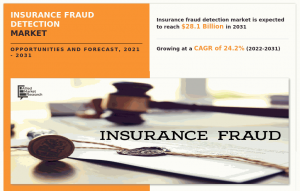ARTICLE AD BOX
NEW CASTLE, DELAWARE, UNITED STATES, December 16, 2023 /EINPresswire.com/ — Insurance frauds cover the range of improper activities which an individual may commit in order to achieve a favorable outcome from the insurance company. This could range from staging the incident, misrepresenting the situation including the relevant actors and the cause of incident and finally the extent of damage caused. Insurance fraud detection is a challenging problem, given the variety of fraud patterns and relatively small ratio of known frauds in typical samples. While building detection models, the savings from loss prevention needs to be balanced with cost of false alerts. Machine learning techniques allow for improving predictive accuracy, enabling loss control units to achieve higher coverage with low false positive rates.
Request Sample Report@ https://www.alliedmarketresearch.com/request-sample/7313
Allied Market Research recently published a report, titled, “Insurance Fraud Detection Market by Component (Solution, Services), by Deployment Mode (On-premises, Cloud), by Enterprise Size (Large Enterprises, Small and Medium-sized Enterprises (SMEs)), by Applications (Payment Fraud and Billing Fraud, Identity Theft, Claims Fraud, Money Laundering): Global Opportunity Analysis and Industry Forecast, 2021-2031.” According to the report, the global insurance fraud detection industry generated $3.3 billion in 2021, and is expected to reach $28.1 billion by 2031, witnessing a CAGR of 24.2% from 2022 to 2031.
According to FBI, the insurance industry in the U.S. consists of over 7000 companies that collectively received over $1 trillion annually in premiums. FBI also estimates the total cost of life insurance fraud detection (non-health insurance) to be more than $40 billion annually. Furthermore, it must be noted that insurance fraud is not a victimless crime, the losses due to frauds, impact all the involved parties through increased premium costs, trust deficit during the claims process and impacts to process efficiency and innovation. Hence, the insurance industry has an urgent need to develop capability that can help identify potential frauds with a high degree of accuracy, so that other claims can be cleared rapidly while identified cases can be scrutinized in detail.
Drivers, Restraints, and Opportunities
Rise in use of advanced analytics & technologies for determining fake medical records, inaccurate claims, abductions, and others along with improvements in cyber security infrastructure drive the growth of the global insurance fraud detection market. However, improper handling of data and privacy issues limit the market growth. On the other hand, surge in adoption of advanced technologies such as artificial intelligence and machine learning for detecting fraud in insurance claims creates new opportunities in the coming years.
Covid-19 Scenario
The Covid-19 pandemic raised the claims of insurances across the globe in different sectors, specifically in the healthcare sector due to surge in number of hospitalizations of infected patients.
With the rise in number of claims related to healthcare, the fraudulent claims surged substantially. Insurance providers are adopting advanced technologies and utilizing data to detect fraudulent claims and tackle losses. Moreover, they carried out cross-industry anti-fraud collaborations to protect honest customers.
Many insurance companies underwent the digital transformation programs to detect sophisticated and evolving fraudulent insurance claim behaviors.
The Solution Segment to Maintain Its Lead Status Throughout the Forecast Period
Based on component, the solution segment accounted for the highest market share in 2021, contributing to nearly three-fourths of the global insurance fraud detection market, and is estimated to maintain its lead status throughout the forecast period. This is attributed to rise in instances of inaccurate claims, abductions, deaths, and fake medical records along with the integration of insurance fraud detection solutions with the internet of things (IoT) and artificial intelligence (AI). However, the services segment is expected to manifest the fastest CAGR of 27.8% from 2022 to 2031, owing to offering of professional & managed services including consulting, support & maintenance, and training services that are designed for consumers to mitigate fraud risks.
Interested to Procure the Data? Inquire Here @ https://www.alliedmarketresearch.com/purchase-enquiry/7313
The Payment Fraud and Billing Fraud Segment to Maintain Its Leadership Status By 2031
Based on application, the payment fraud and billing fraud segment held the highest share in 2021, accounting for nearly two-fifths of the global insurance fraud detection market, and is projected to maintain its leadership status by 2031. This is due to surge in insurance fraud detection software for payment and billing fraud detection and adoption of standard rule-based anti-fraud system offered by banks and institutions. However, the claims fraud segment is projected to witness the highest CAGR of 26.8% from 2022 to 2031. This is owing to implementation of machine learning and AI-based algorithms and solutions by insurers to process claims quickly and efficiently.
Asia-Pacific to Continue Its Lead Position by 2031
Based on region, Asia-Pacific contributed to the highest market share in terms of revenue in 2021, accounting for more than one-third of the global market, and is projected to continue its lead position by 2031. This is attributed to the trend of modernization & digitalization, investments in digital tools & solutions and hybrid agency models, and adoption of advanced technologies such as AI and big data analytics. However, North America is estimated to witness the largest CAGR of 26.6% during the forecast period. This is due to rise in the demand for disability insurance services, increase in adoption of digital advisor tools, investments in analytics capabilities and claims automation. In addition, market players in this region are offering pay-as-you-go product & solutions and forming new partnerships and collaborations.
Enquire for Customization with Detailed Analysis of COVID-19 Impact in Report @ https://www.alliedmarketresearch.com/request-for-customization/7313?reqfor=covid
Leading Market Players
BAE Systems
Duck Creek Technologies
Equifax Inc.
Experian Information Solutions, Inc.
FICO
FRISS
Fiserv, Inc.
IBM
LexisNexis Risk Solutions Group.
SAS Institute Inc.
Related Reports:
Single-Trip Travel Insurance Market https://www.alliedmarketresearch.com/single-trip-travel-insurance-market-A15614
Banks Guarantee Market https://www.alliedmarketresearch.com/bank-guarantee-market-A15510
Commercial Lending Market https://www.alliedmarketresearch.com/commercial-lending-market-A11617
Financial Protection Market https://www.alliedmarketresearch.com/financial-protection-market
U.S. Insurance Third Party Administrator Market https://www.alliedmarketresearch.com/us-insurance-third-party-administrator-market-A14535
Motor Vehicle Liability Insurance Market https://www.alliedmarketresearch.com/motor-vehicle-liability-insurance-market-A14484
David Correa
Allied Market Research
+1 800-792-5285
email us here
Visit us on social media:
Facebook
Twitter
LinkedIn
![]()
The content is by EIN Presswire. Headlines of Today Media is not responsible for the content provided or any links related to this content. Headlines of Today Media is not responsible for the correctness, topicality or the quality of the content.
.png)
 1 year ago
9
1 year ago
9

 ,
,







 English (US)
English (US)